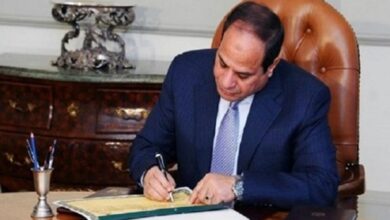The chairman of Egypt’s High Elections Commission’s (HEC) technical office revealed that the HEC is considering whether to raise the ceiling for campaign adertisements to 4 or 5 times the former ceiling of LE150,000.
Chancellor Yousry Abdel Karim, chairman of the Technical Office and vice president of the HEC, attributed the increase to the widening of electoral constituencies. He said it was “impossible for the ceiling of LE150,000 to remain as is.”
Abdel Karim commented on the HEC’s decision to extend the nomination process to 22 October by saying the HEC was trying to “facilitate any difficulties” for the parties.
“They asked for this… and we hope they benefit from the extension,” he said, noting that the nomination process will now be open for a total of 11 days which is “the longest [nomination] period in the history of Egypt’s elections.”
Abdel Karim went on to say that the number of those applying for nomination during the first four days was 2411 candidates, including 2300 for the People’s Assembly and 111 for the Shura Council, Egypt’s upper and lower houses of parliament. He added that the number of those applying on Saturday reached 396 candidates, with 396 for the People’s Assembly and 53 for the Shura Council.
Meanwhile, HEC President Abdel Moaz Ibrahim said the draft law on political isolation had not yet been presented to HEC, stressing that failing to obtain the HEC’s opinion on the law “will cause legal and constitutional challenges that could lead to it being appealed.”
Abdel Moaz said that the HEC cannot determine the mechanism by which the law will be implemented prior to it being issued, noting that if the law is approved it will be presented to the HEC members to discuss how to implement its procedures and rules.
He went on to say that Egyptians abroad have the right to vote in upcoming elections as a matter of principle, but described the decision as to whether they will be allowed to vote as a “sovereign decision taken by the state.”
He pointed to the existence of a “procedural problem,” explaining that the HEC has no “database with numbers and places of residence” and that “the number of judges is not sufficient to oversee the elections abroad.”
He noted that in order for Egyptian expatriates to vote, there must be a “legislative amendment to give embassy consuls the right to supervise elections abroad.”
Abdel Moaz also noted that the proportion of young people who applied for candidacy was “minute” despite the minimum age for candidates being lowered to 25 years to motivate them to run in the elections. He added that the number of female candidates was also low.
Abdel Moaz went on to discuss the supervision of the upcoming elections by civil society and international organizations, saying “there is no such thing as monitoring… there is only follow-up.” He added that the “HEC monitors itself well.”
Abdel Moaz added that an agreement with the National Council for Human Rights had been made for it to “organize the work of civil society institutions to monitor the election… and follow the elections in all Egyptian governorates with the exception of Cairo.”
He pointed out that the security authority’s role would be limited to protecting the exterior of election committees, unless the committee chairman called in the security official responsible for securing the committee.
“If there is a problem inside the committee then the judge has the right to call in the security officer. However, problems outside the committee are dealt with directly,” he said.
Translated from the Arabic Edition




